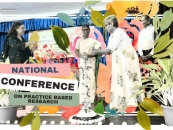
4 Assam schools show way to protect nature
by The Daily Eye Team November 4 2013, 4:35 pm Estimated Reading Time: 1 min, 49 secsGUWAHATI: Respect for nature and environment cannot be inculcated in a day. But if ingrained from childhood, an individual can grow up to become a responsible citizen.
With this idea in mind, some schools in Assam have started green drives and environment-friendly activities.
The Kuthuri Higher Secondary School near Kaziranga National Park has now become a plastic-free zone. Students and teachers there promote eco-friendly, bio-degradable materials for everyday use on the school premises and also take part in bird-watching trips.
Similarly, the Lokopriya Gopinath Bordoloi High School near Pobitora Wildlife Sanctuary, Salbari Higher Secondary School near Manas National Park and Deshbhakta Tarun Ram Phukan ME School near Deepor Beel have become model schools in the state where community-linked education for sustainable development (ESD) is being inculcated among teachers and students.
WWF-India, in association with the education department, has started a pilot project to propagate consciousness regarding conservation of nature and sustainable use of resources through eco-friendly means in these schools.
While the four schools have showed the way how ESD can be promoted, WWF-India and the education department are now eyeing other schools in the state so that they also become model schools under this initiative.
WWF-India said the District Institute of Education and Training (DIET) have already identified 15 model schools in different districts where EDS campaign will be taken up based on the locally relevant themes (LORET) model developed by Sweden’s Uppsala University and the Institute for Research in Education and Sustainable Development.
WWF-India’s environment education director Mita Nangia Goswami said the LORET model integrates issues of sustainable development into school curriculum and teaching. It identifies key issues for sustainable development in the local community, discusses these in groups and prioritizes one issue at a time. Then, groups of teachers willing to work on developing a LORET and help in its implementation are put together.
On Thursday, DIET representatives from various districts, officials of State Council Educational Research and Training (SCERT) and teachers from several schools took part in a workshop where the LORET model was demonstrated. The successful implementation of LORET in different countries was also demonstrated in the presence of ESD specialist Staffan Svanberg.
Read More Here.





-173X130.jpg)
-173X130.jpg)


-173X130.jpg)
-173X130.jpg)
-173X130.jpg)